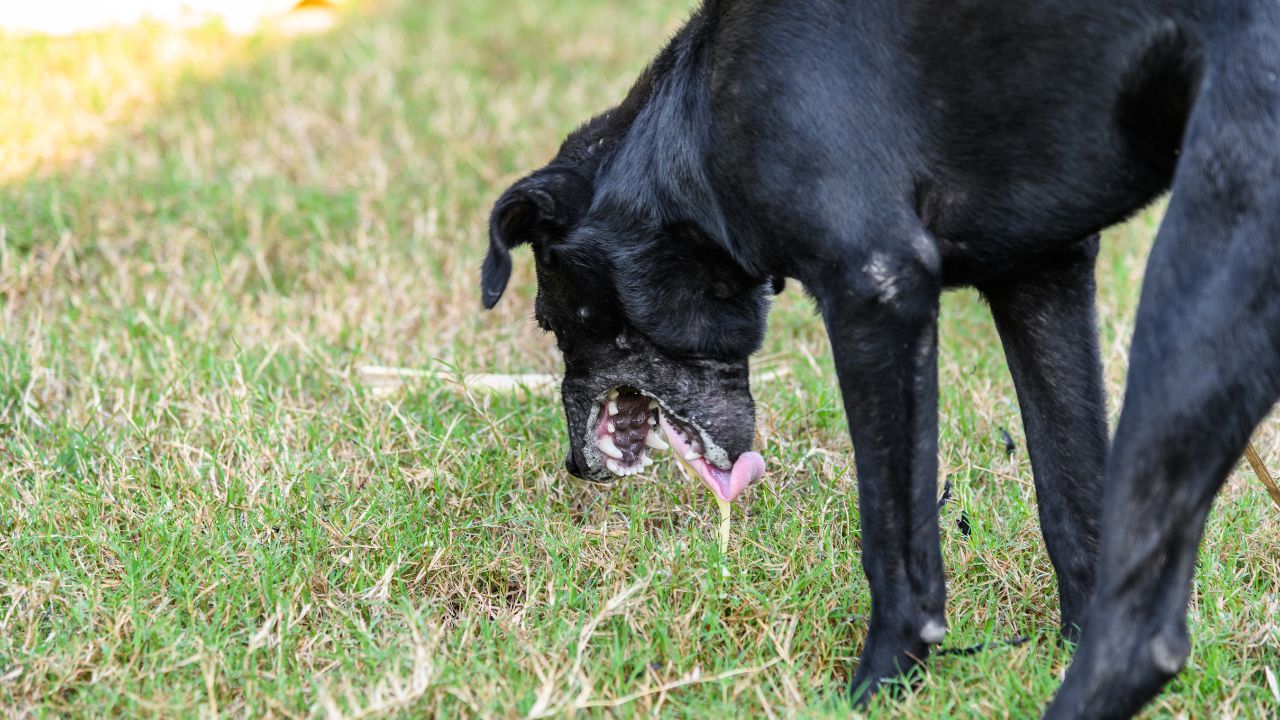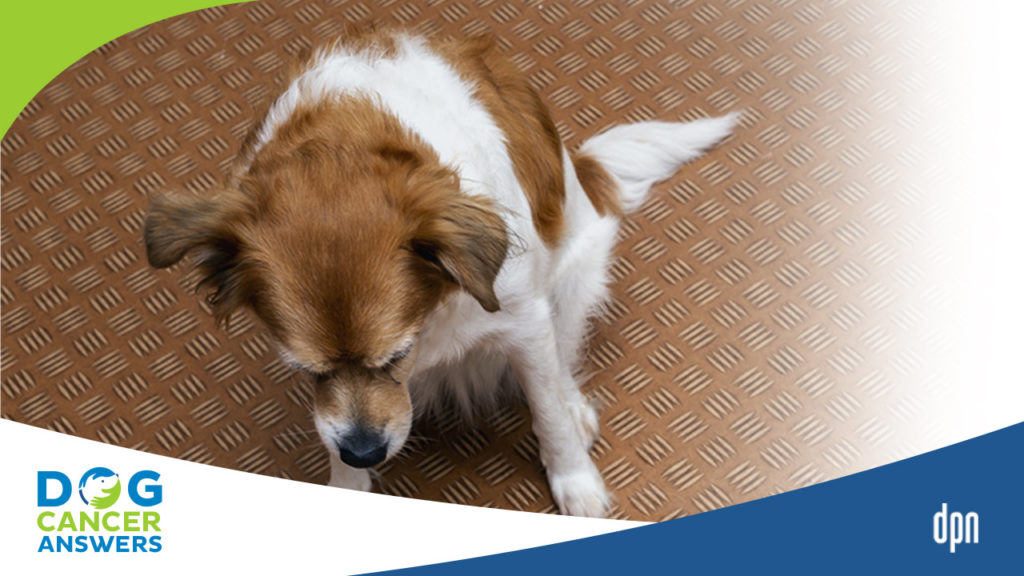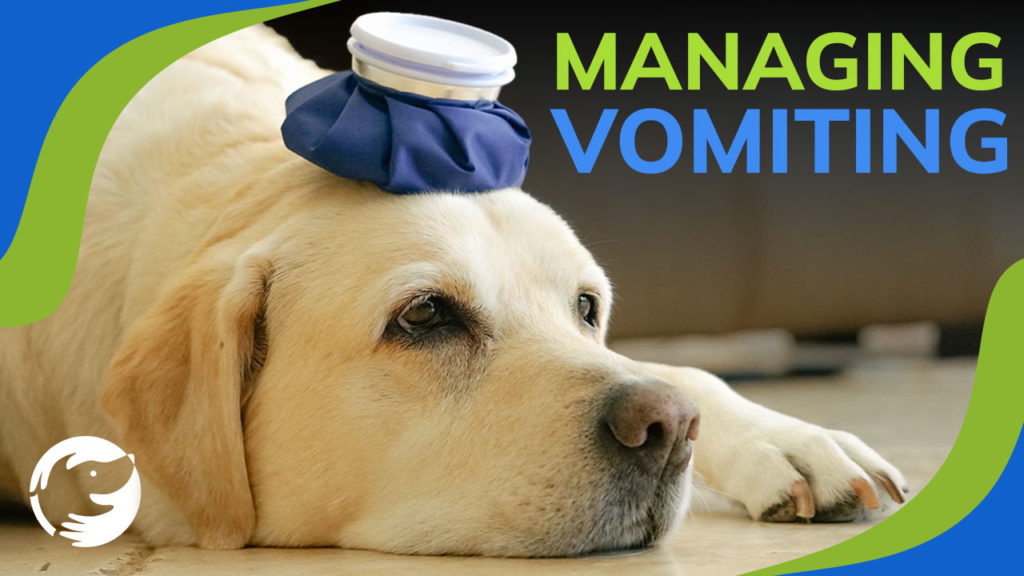Anyone who has ever vomited knows it can be painful, inconvenient, and draining. The same is true for vomiting in dogs. The good news is that we have many tools to combat vomiting or prevent it from happening in the first place.
Key Takeaways
- If your dog has vomited once in the last 24 hours, don’t be too concerned. But if your dog is vomiting three or four times a day, or once a day for days in a row, call your veterinarian.
- The most common cause of vomiting in dogs is eating something they shouldn’t. Still, other causes include sudden or too many diet, medication, and supplement changes, toxins and poisons, and various illnesses such as pancreatitis and liver failure.
- Vomiting is common in dogs with cancer as a side effect of cancer treatments or cancer itself.
- If your dog vomits, withhold food for 12 hours to rest their tummy. Then offer bland food like chicken and rice to see how they do. If vomiting continues, your veterinarian may give fluids and medications to reduce nausea and vomiting. There are some at-home medications, both prescription and over-the-counter, that may also help.
- Thin, yellow-colored vomit may be caused by Acid Reflux.
What Happens During Vomiting
Vomiting is the act of expelling your dog’s stomach contents (and even upper small intestines) back up through the esophagus and out the mouth. Vomiting in dogs is an active process, with the diaphragm and abdominal muscles contracting forcefully to send everything back the way it came. Like us, dogs do not enjoy vomiting.
To recognize vomiting in your dog, look for:
- A slightly hunched posture with his head lower than his topline
- Drooling
- Dry heaving or gulping movements
- Abdominal contractions
- Retching noises
- Puddles of partially digested food or bile
Regurgitation Vs. Vomiting
Sometimes we think a dog has vomited, but they have just regurgitated their food. Unlike vomiting, regurgitation is a passive process. There is usually very little warning when it happens – your dog may simply burp and then suddenly there is a puddle of liquid or food matter on the floor. Your dog will likely appear as surprised as you are.
Regurgitation usually occurs when food or liquid gets stuck in the esophagus and never makes it to the stomach. Regurgitation once in a while isn’t too concerning, but frequent regurgitation can be a symptom of more serious conditions such as megaesophagus, esophagitis, or cancer of the esophagus.3
 Why Dogs Vomit
Why Dogs Vomit
The most common cause of vomiting in dogs is eating something that they shouldn’t have. Garbage, an entire turkey carcass, underwear… the list of things dogs mistake for good food is endless.
While it isn’t pleasant, vomiting due to dietary indiscretion is usually transient and not a cause for concern. Your dog will throw up once or twice but should otherwise seem happy and healthy.
Vomiting is what veterinarians call a “non-specific symptom.” That means it is common to many illnesses and conditions, so you can’t tell right away what is causing the vomiting.
In addition to eating something bad, other potential causes of vomiting include:
- Eating or drinking too quickly
- Diet change
- Intestinal parasites
- Acid reflux
- Medication side effect
- Bacterial infections
- Toxins and poisons
- Bloat
- Pancreatitis
- Kidney disease
- Liver failure
- Some viruses
- Cancer
As you can see, there are many things that might cause your dog to vomit, which is why your vet might not know the cause immediately.
Vomiting Up Yellow Bile (Acid Reflux)
Excess stomach acid can sometimes give your dog acid reflux, especially when her stomach is empty. Some dogs will throw up a small amount of yellow bile first thing in the morning – this is a common sign of acid reflux.
Vomiting Due to Cancer
The time to start wondering if your otherwise healthy dog’s vomiting is related to cancer is if he is also losing weight rapidly.4
If your dog has been diagnosed with cancer, the illness itself might cause vomiting, although it is fairly uncommon unless the cancer is directly affecting the gastrointestinal tract in some way.
More commonly in dogs with cancer, vomiting is a side effect from treatment and medications or a response to a change in diet or the addition of a new supplement. Any oral medication or supplement can cause vomiting, and all dogs are individuals with unique sensitivities. Chemotherapy also can cause nausea and vomiting.4
Vomiting Because of Too Many Changes
Dietary changes, oral medications, supplements, chemotherapy and other treatments can all cause vomiting. When these all happen at the same time, vomiting is even more likely to occur.
It’s very common for dog lovers to want to get going and use everything they can, right away. However, making too many changes at once can upset a dog’s stomach. It may be better to introduce new things slowly, one at a time, and see how the dog tolerates them before adding something new.
Therefore, many veterinarians and oncologists tell clients not to start a new diet or supplement when their dogs are about to go into chemotherapy, surgery, or radiation. They like to see how the dog does without adding in other factors. For example, if a dog is starting chemotherapy, and the agent being used commonly causes vomiting, the oncologist will have a harder time calculating future doses if other changes have been made. They won’t know if the vomiting was triggered by a combination of changes, or just the chemo treatment.
When to Call Your Vet about Vomiting
An isolated incident of vomiting is usually nothing to worry about. But if your dog continues to vomit three or four times in a day or throws up once a day several days in a row, it is time to call your vet. For dogs undergoing cancer treatment, your veterinarian or oncologist may give you specific instructions on when to let them know about vomiting so that they can adjust the treatment plan. When in doubt, trust your gut, and call the office any time you feel like your dog isn’t right.
The other time to be concerned is if your dog is acting sick or has other symptoms as well as vomiting. Here are some accompanying symptoms to be concerned about:4
- Diarrhea
- Dehydration
- Abdominal pain
- Distended or swollen abdomen
- Pale gums
- Losing weight
- If your dog shows any of these symptoms and is vomiting – even once – it is time for a vet visit. Vomiting PLUS diarrhea is an emergency because your dog can get dehydrated quickly.
Dry heaving without throwing anything up is also an emergency – this can indicate bloat, a condition where the stomach fills with gas and can twist.
Also, whenever you are concerned about your dog throwing up is an okay time to call your vet and ask for advice.
Calling the Vet About Vomiting During Cancer Treatment
While vomiting is not a common sign of cancer, it is more worrying if your dog with cancer throws up. This could be due to the havoc that progressing cancer wreaks on the body, but it can also be a side effect of cancer treatments and medications.
If your dog with cancer vomits, think about any changes that were made recently. Ask yourself:
- Did he start a new medication?
- Did he just have a chemo treatment?
- Did you change his diet or add a new supplement?
All of these things can cause vomiting. Call your vet or oncologist with your observations.
If your dog is already on an anti-nausea and anti-vomiting medication like Cerenia, any vomiting is worrying. This means that whatever is causing your dog to feel sick is overriding the medication.
Things that Help Vomiting
There are a variety of treatments and strategies that you can use to stop or prevent vomiting.
How to Fast and Feed a Bland Diet
For mild cases of vomiting in an otherwise healthy dog, vomiting can often be managed with fasting and feeding a bland diet for a day or two. Call your veterinarian’s office first to tell them what you have observed and see if home monitoring is a reasonable option.
- Start by withholding all food and only offering small amounts of water at a time for up to twelve hours. This rests the gastrointestinal tract.
- If your dog does not throw up during that time, offer a small serving of something bland, like boiled chicken breast or plain cooked rice. You might also use plain boiled hamburger or cooked pasta. These foods are easy to digest and typically do not upset the stomach. These diets are not nutritionally balanced and are not appropriate for long-term use.
- If he keeps that down, he can have a little more in another hour.
- Resume normal feeding food and schedule if your dog is still doing well after 24-48 hours.
We are often tempted to give our dog a big meal when they start to eat after throwing up. We feel relieved that they are eating again and want to “make up” for the food they lost. Don’t do this, however. Their system may still be tender, and too much food may induce vomiting again. It’s better to stick to small amounts of bland food until you are sure they are keeping food down.
Medications and Treatments That Help Vomiting
If your dog is sick or has been vomiting persistently, he needs to be seen by your vet. Exact treatment will vary depending on the cause (see below), but your pup will probably get subcutaneous (under the skin) fluids to help with hydration and an injection of maropitant (Cerenia) to stop the vomiting and help him feel less pukey.
Ondansetron (brand name Zofran) is also sometimes used to stop vomiting in dogs, but Cerenia is FDA-approved for dogs and generally works better. Cerenia is available both as an injectable given at the hospital and in a tablet form that you can give at home. Another medication that your veterinarian may prescribe for nausea and/or vomiting is metoclopramide (brand name Reglan or Maxolon).2 This is available as an injection, oral tablet, or oral liquid.
Always talk to your veterinarian before giving any medication, even ones that are available over the counter. Your vet can give you an accurate dose appropriate for your dog’s weight and also make sure that the anti-emetic or antacid will not interfere with any of your dog’s other medications.
Medications and Treatments That Help Acid Reflux
If acid reflux is suspected, over-the-counter antacids, such as Pepcid, Pepto-Bismol, omeprazole, or even good old Tums can help keep your pup’s stomach acid under control.5 Always talk to your veterinarian before giving one of these medications to make sure that you are giving the right dose and that it won’t interfere with any of your dog’s other meds. If your dog has high blood calcium levels, do not give Tums.
An even easier solution for acid reflux that works for many dogs is to give her a snack! Even one biscuit just before bed and/or first thing in the morning can help to keep a little food in her stomach and prevent an upset stomach. You can also give a small snack at midday when their stomach is empty.
Supplements
There are some supplements that may help your dog over time.
- Probiotics help to normalize the GI tract and may help with vomiting.
- Ginger can help to soothe the GI tract and prevent nausea.
Environmental Management
If your dog gets carsick, mix up where he rides in the car. Some dogs do best up high where they can see out the windows, while others feel better in a covered crate.
If your dog likes to eat things outside like cat poop, dog poop, or garbage, try to be proactive and pick them up before she sees them.
Tips for Cleaning Up Dog Vomit
Here are some of our favorite tips for cleaning up a vomit mess.
Catch the vomit. If you hear that tell-tale urp noise, either move your dog to the nearest hard floor or toss a towel or large bowl under her face. Tile and laminate are much easier to clean than carpet, and towels can be tossed in the washing machine.
Rinse rugs and towels before putting in the washer. Your washing machine isn’t going to like chunks. Scoop up any semi-solids into the trash, and then rinse rugs and towels in the tub, sink, or outside with a hose before popping them in the washing machine. This will also help to prevent any clothing in that load from being stained by bile.
Pick up solids first. Pick up any solid or semi-solid vomitus with paper towels or a rag and dispose of them in the trash. Some owners allow their dogs to eat the partially digested food again if they want to, but if your dog has thrown up the same meal multiple times, intervene.
Blot, don’t wipe. Getting the liquid vomit out of your carpet is the tricky part. Wiping or scrubbing can force vomit particles deeper into the carpet and make the mess worse, so stick to blotting. Blot with a clean paper towel or cloth, and repeat until the cloth comes back clean. A slightly damp paper towel can also help to get up extra mess.
Fight odor and stains with a cleaning spray. Once the area has been thoroughly blotted and is mostly clean, spritz with a carpet-safe cleaner and repeat until the stain is totally gone. We really like the Nature’s Miracle cleaning products. , but we also have a variety of natural cleaners available in our online shop and a recipe for a carpet-safe vinegar spray.
Follow the instructions on the bottle for any premade cleaning products, and always spot-test before dousing your whole carpet.
Steam cleaning can help too. Many hardware stores and even some pet supply and department stores will rent out carpet cleaners for a reasonable price so you can give your entire carpet a good thorough cleaning. We have tried the Bissell ProHeat 2X Revolution Max Clean Pet Pro Full-Size Carpet Cleaner, and have been very happy with it. Tip: vacuum the carpets thoroughly first, so you don’t gum up the carpet cleaner with dog hair.
Is Vomiting a Sign of Death Approaching?
Vomiting in dogs is usually not a sign that your dog is dying. Occasional bouts of vomiting are not a cause for panic even in dogs with cancer. Talk to your veterinarian or oncologist to devise a plan to prevent future episodes.
Vomiting is more concerning if it continues for a long time, or if it does not respond to treatment. Persistent vomiting can quickly lead to dehydration, and dehydration is life-threatening.
- Wood B. Nausea and Vomiting (Emesis). HealthEngine. https://healthinfo.healthengine.com.au/nausea-and-vomiting-emesis#:~:text=The%20vomiting%20centre%20is%20predominantly,zone%20(CTZ)%20sending%20impulses. Published March 21, 2019. Accessed December 8, 2022.
- Gollakner R. Metoclopramide. VCA Animal Hospitals. https://vcahospitals.com/know-your-pet/metoclopramide#:~:text=Metoclopramide%20(brand%20names%20Reglan%C2%AE,connecting%20the%20throat%20and%20stomach. Accessed December 8, 2022.
- Coates J. Dog Regurgitation. PetMD. https://www.petmd.com/dog/symptoms/dog-regurgitation. Published September 9, 2022. Accessed December 8, 2022.
- Dog Vomiting: Does My Dog Have Cancer? Clear Canine Cancer. https://clearcaninecancer.com/dog-vomiting-does-my-dog-have-cancer/. Published May 29, 2022. Accessed December 8, 2022.
- Primovic D. 15 Human Over-the-Counter Drugs Safe for Dogs. PetPlace. https://www.petplace.com/article/dogs/drug-library/15-human-counter-drugs-safe-dogs/. Published March 11, 2018. Accessed December 8, 2022.
Topics
Did You Find This Helpful? Share It with Your Pack!
Use the buttons to share what you learned on social media, download a PDF, print this out, or email it to your veterinarian.






